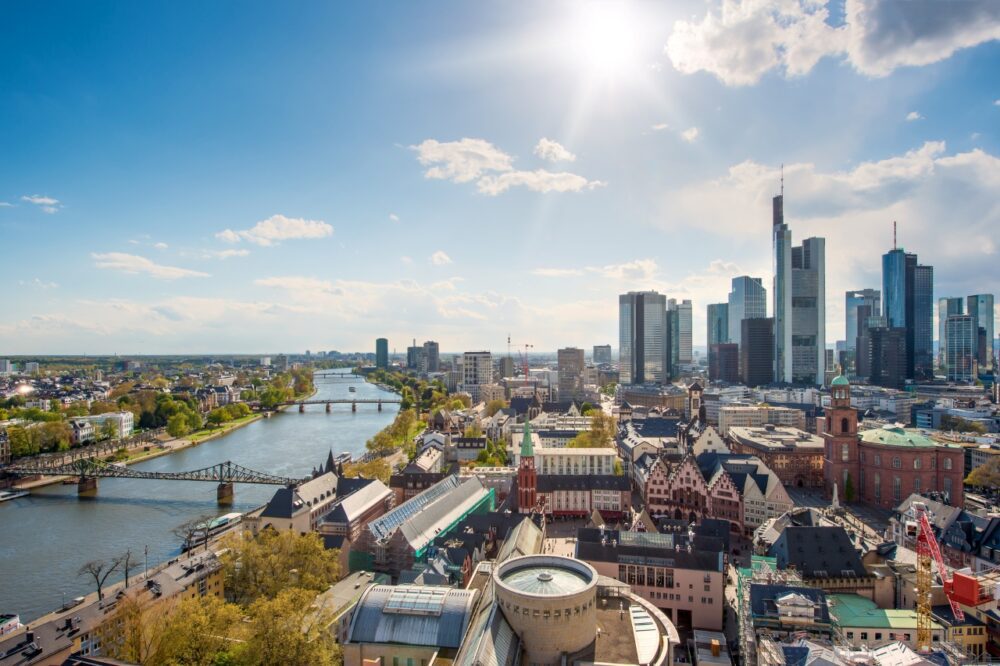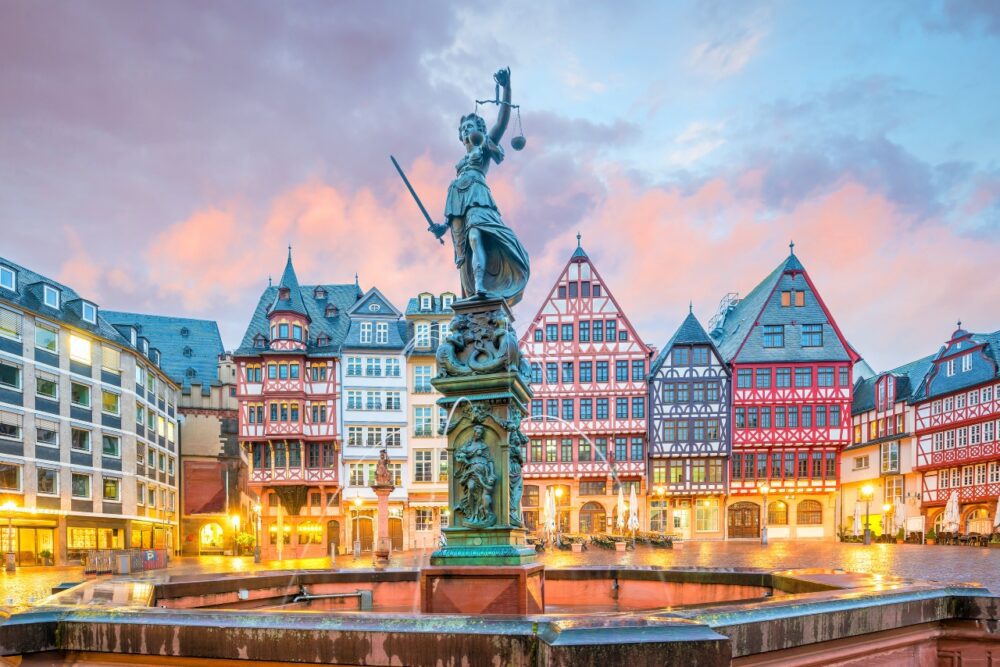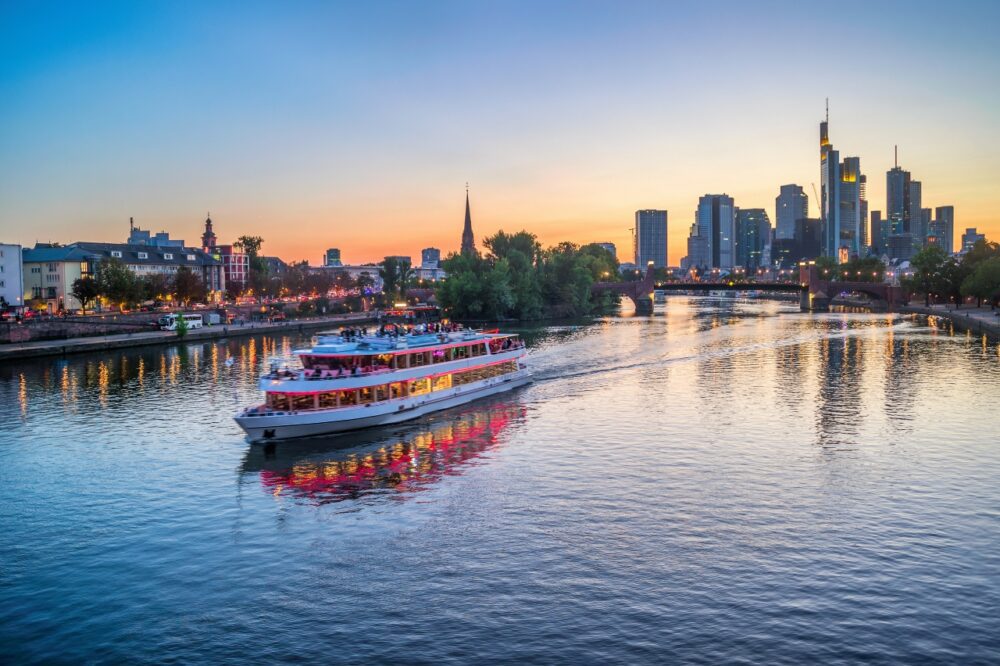
Is Frankfurt worth visiting? Absolutely! The first time I visited Frankfurt, I was pleasantly surprised by how much this city has to offer. Often seen as just a financial hub, Frankfurt impressed me with its mix of gleaming skyscrapers, historic charm, and vibrant cultural scene. Walking through the Old Town’s Römer square and then gazing at the skyline from the banks of the Main River, I quickly realised Frankfurt is a city of contrasts—and that’s what makes it so fascinating.
Located in the heart of Germany, Frankfurt is a major gateway to Europe and one of the country’s most dynamic cities. It’s home to the European Central Bank, world-class museums on the Museum Embankment, and one of the largest book fairs in the world. Yet, it also retains a cosy side, with quaint neighbourhoods, lively markets, and traditional apple wine taverns. Whether you’re here for business or leisure, Frankfurt offers a unique blend of old and new. But is Frankfurt worth visiting for you?
In this blog post, we’ll uncover the top 10 reasons why Frankfurt should be on your travel list, from its architectural landmarks to its hidden gems. Plus, we’ll share travel tips to help you plan the perfect visit. Keep reading to discover why Frankfurt is more than just a stopover destination.
Table of Contents
Pros – Reasons You Should Visit Frankfurt
1. A Fascinating Mix of Old and New Architecture

Frankfurt is a city that effortlessly blends the old with the new. As Germany’s financial capital, it is known for its impressive skyline, with towering skyscrapers giving it a modern, international feel. At the same time, the city has a well-preserved historic centre that offers a glimpse into its medieval past. This contrast between traditional and contemporary makes Frankfurt one of the most unique cities in Germany.
One of the best places to see this mix is Römerberg, the historic heart of the city. This charming square is lined with reconstructed half-timbered houses, giving it the feel of a traditional German town. Walking through the area, I could almost forget I was in a major financial hub, especially when visiting Frankfurt Cathedral, a striking Gothic church that played an important role in the Holy Roman Empire. Just a short walk away, however, the towering Main Tower offers a completely different experience. I took the lift to the observation deck, where the panoramic views over the skyline and the River Main showed Frankfurt’s modern side in all its glory.
2. One of Europe’s Best Transport Hubs
Frankfurt is one of the best-connected cities in Europe, making it an ideal gateway for travellers. Frankfurt Airport is one of the busiest in the world, with direct flights to almost every major destination. The city’s central location also means it has excellent rail links, with high-speed trains connecting it to Berlin, Munich, Paris, and beyond. Whether you’re using Frankfurt as a base for further travel or just passing through, the city’s transport options make getting around incredibly convenient.
I found the public transport system to be one of the best I’ve used in Germany. The U-Bahn (underground) and S-Bahn (suburban trains) are fast, reliable, and easy to navigate, making it simple to reach any part of the city. I used the trains to take a day trip to Heidelberg, a stunning university town just an hour away, and the journey was smooth and efficient. Even the trams and buses run frequently, meaning you rarely have to wait long to get to where you need to go. Unlike some cities where public transport feels confusing or unreliable, Frankfurt’s system is well-organised and makes exploring stress-free.
3. A World-Class Financial and Business Hub
As the home of the European Central Bank and the Frankfurt Stock Exchange, Frankfurt is often called the financial capital of Germany. While this might not sound like an exciting reason to visit, it actually gives the city a cosmopolitan feel, with an international community, excellent business opportunities, and a dynamic cultural scene.
Walking through the Bankenviertel (Banking District), I was struck by the energy of the area, with modern glass buildings, luxury hotels, and high-end restaurants catering to professionals from around the world. The city’s financial status also means that it hosts major international events, such as the Frankfurt Book Fair, the world’s largest publishing trade fair. Even if you’re not visiting for business, the global influence is noticeable in the city’s restaurants, cultural festivals, and diverse population. Frankfurt might be a centre for finance, but it’s far from just a city of suits and office buildings—it has a vibrant, lively atmosphere that makes it an exciting place to visit.
4. A Fantastic Museum Scene
Frankfurt is home to some of Germany’s best museums, particularly along the Museumsufer (Museum Embankment), a stretch of cultural institutions lining the banks of the River Main. Whether you’re interested in art, history, science, or film, there’s a museum for everyone, making it a fantastic destination for culture lovers.
One of the highlights for me was the Städel Museum, which has an outstanding collection of European art, including works by Rembrandt, Vermeer, and Monet. The museum itself is beautifully designed, with a modern underground exhibition space that feels almost futuristic. Another fascinating museum was the German Film Museum, which explores the history of cinema through interactive exhibits and classic film screenings. Even smaller, lesser-known museums like the Museum of Communication offer unique and engaging experiences. With so many options, it’s easy to spend an entire day exploring Frankfurt’s rich cultural offerings.
5. A Great Food Scene with International and Local Specialities
Frankfurt has a surprisingly diverse food scene, offering everything from traditional German dishes to international cuisine influenced by its multicultural population. The city’s location in Hesse means it has its own regional specialities, many of which are different from the dishes found in Bavaria or Berlin.
One of the must-try local foods is Grüne Soße (Green Sauce), a cold herb-based sauce traditionally served with boiled eggs and potatoes. I was sceptical at first, but the fresh, tangy flavour was incredibly refreshing, especially on a warm day. Another local favourite is Handkäse mit Musik, a strong-smelling cheese marinated in vinegar and onions, often eaten with a side of rye bread. If you prefer heartier fare, Frankfurt’s version of the Bratwurst, known as the Frankfurter Wurstchen, is a simple but delicious sausage often served with mustard. Beyond local cuisine, the city has excellent international food options, from Turkish kebabs to authentic Japanese ramen, reflecting its diverse population.
6. A Relaxed Riverside Atmosphere Along the Main

Despite being a major financial hub, Frankfurt has plenty of green spaces and relaxing spots, especially along the River Main. The riverbanks are lined with walking and cycling paths, creating a peaceful escape from the busy city streets. Whether you want to take a leisurely stroll, have a picnic, or simply sit by the water and watch the boats pass by, the riverside is a perfect place to unwind.
I particularly enjoyed walking along the Eiserner Steg, the city’s famous iron footbridge, which offers stunning views of the skyline and the Old Town. The area around Holbeinsteg, another pedestrian bridge, was also a great spot to sit with a coffee and enjoy the calm atmosphere. In summer, the Mainuferfest, a festival along the river, brings the area to life with music, food stalls, and entertainment. The riverside is one of Frankfurt’s best features, offering a balance between city life and natural beauty.
7. A Vibrant Christmas Market in Winter
If you visit Frankfurt in December, the Frankfurter Weihnachtsmarkt (Frankfurt Christmas Market) is one of the best in Germany. The festive stalls, twinkling lights, and smell of mulled wine create a magical atmosphere that makes the city feel completely different from its usual modern businesslike image.
I visited the Christmas market in Römerberg, and it was everything I had hoped for—wooden huts selling handcrafted ornaments, the scent of roasted almonds filling the air, and a giant Christmas tree glowing in the centre of the square. I tried Glühwein (mulled wine) and Bethmännchen, a local marzipan treat traditionally made during the festive season. Unlike some smaller Christmas markets, Frankfurt’s is large and lively, with a great mix of food, drinks, and holiday decorations. Even if you’ve seen other Christmas markets in Germany, Frankfurt’s festive atmosphere makes it a must-visit during the winter months.
Cons – Things to Consider When Visiting Frankfurt
1. The City Lacks the Charm of Other German Destinations
While Frankfurt has an impressive skyline, excellent museums, and a strong cultural scene, it doesn’t have the same charm as cities like Munich, Heidelberg, or Cologne. Much of the city was heavily bombed during the Second World War, and as a result, large parts were rebuilt with modern, functional architecture rather than traditional German designs. Although some areas, like Römerberg, have been reconstructed to reflect the city’s past, much of Frankfurt has a corporate, business-like feel rather than the romantic, fairy-tale atmosphere that many travellers associate with Germany.
I noticed this contrast immediately upon arriving in Frankfurt. While the skyscrapers in the banking district were undeniably impressive, they lacked the character of the medieval streets I had seen in other German cities. Even Römerberg, though picturesque, felt somewhat artificial compared to the authentic historic centres in places like Bamberg or Rothenburg ob der Tauber. Frankfurt is certainly interesting, but if you’re looking for a classic German experience with half-timbered houses, cobbled streets, and historic charm, you may find other cities more appealing.
2. It Can Feel Too Business-Oriented and Lacks a Strong Local Identity
As Germany’s financial capital, Frankfurt is a city that revolves around banking, trade fairs, and international business. While this makes it an economic powerhouse, it also gives the city a somewhat transient feel. Many of the people you see in Frankfurt are business travellers, expats, or visitors passing through rather than long-term residents with deep local roots. This can make it harder to connect with the city on a cultural level, as it sometimes feels more like a global financial hub than a place with a strong local identity.
I found this particularly noticeable when exploring the nightlife and dining scene. While there were excellent restaurants and bars, many of them catered to business professionals rather than offering a distinct Frankfurt character. In contrast, when I visited other German cities, I found more places that felt uniquely tied to their history, traditions, and regional culture. While Frankfurt does have some traditional aspects, such as its Apfelwein taverns, these are often overshadowed by the city’s modern, international atmosphere. If you’re looking for a destination with a deep-rooted local culture, Frankfurt may not be the best choice.
3. It’s More Expensive Than Other German Cities
Frankfurt is one of the most expensive cities in Germany, particularly when it comes to accommodation, dining, and transport. As a major financial centre, prices are generally higher than in other German destinations, making it less budget-friendly for travellers. While it’s still more affordable than cities like London or Zurich, visitors expecting the low costs often associated with Germany may be surprised by how much they need to spend.
I found this especially noticeable when booking accommodation. Hotels in central areas were significantly more expensive than similar options in places like Leipzig or Nuremberg. Even a basic hotel room or a well-located guesthouse could be quite pricey, especially during major events like the Frankfurt Book Fair. Eating out was also more expensive than I expected, particularly in restaurants catering to the business crowd. While there are ways to save money, such as eating at markets or staying further from the city centre, Frankfurt is not the best option for those travelling on a tight budget.
4. The City Has a Reputation for Safety Issues in Certain Areas
While Frankfurt is generally a safe city, it does have some areas with a reputation for crime, particularly around the main train station. Like many large cities, Frankfurt has issues with drug use and homelessness in certain districts, which can make some visitors feel uneasy, especially after dark. While violent crime is rare, petty crime like pickpocketing and scams can be more common in tourist-heavy areas.
I stayed near the Hauptbahnhof (main train station), which was convenient for getting around, but I quickly noticed that the area had a very different atmosphere compared to the rest of the city. While I never felt directly threatened, the number of people openly using drugs and the general rundown appearance of the streets made it feel less welcoming than other parts of Frankfurt. That said, most of the city is completely safe, and as long as you stay aware of your surroundings, there is little to worry about. Avoiding certain areas at night and keeping an eye on your belongings in busy locations is usually enough to prevent any issues.
When to Visit Frankfurt
The best times to visit Frankfurt are spring (April to June) and early autumn (September to October), when the weather is mild, and the city’s parks and riverbanks are ideal for outdoor exploration. These months also coincide with popular events like the Frankfurt Book Fair in October, drawing international visitors. Summer (July and August) is warm and lively, with open-air festivals and beer gardens in full swing, though it can be busier with tourists. Winter, particularly December, is magical in Frankfurt, with the Römerberg Christmas Market among the most picturesque in Germany.
How to Get to Frankfurt
Frankfurt Airport (FRA) is one of Europe’s busiest hubs, located just 12 kilometres from the city centre. It is well-connected to major global destinations via airlines like Lufthansa, United, and Emirates. From the airport, the S-Bahn (lines S8 and S9) takes just 15 minutes to reach Frankfurt Hauptbahnhof (main train station). The smaller Frankfurt-Hahn Airport (HHN) serves budget carriers like Ryanair, though it’s further from the city and requires a 1.5-hour bus transfer. Frankfurt is also a key rail hub, with high-speed ICE trains connecting it to cities like Cologne, Berlin, and Paris. Buses like FlixBus offer an affordable option for regional travel.
Where to Stay in Frankfurt
Frankfurt offers a range of accommodation options to suit various preferences and budgets:
- Luxury: Innenstadt – Stay in the heart of the city near the financial district and shopping streets. Options like the Jumeirah Frankfurt and Sofitel Frankfurt Opera provide upscale comfort and convenient access to cultural and commercial attractions.
- Mid-range: Sachsenhausen – A charming area south of the Main River, known for its cobbled streets, museums, and apple wine taverns. Hotel Cult Frankfurt and Adina Apartment Hotel Frankfurt Neue Oper offer stylish stays at moderate prices.
- Budget: Bahnhofsviertel – Near the main train station, this area has affordable options like Ibis Frankfurt Centrum and Five Elements Hostel, making it a practical choice for budget-conscious travellers with easy transport links.
Getting Around Frankfurt
Frankfurt’s RMV public transport system is highly efficient, with U-Bahn (subway), S-Bahn (regional trains), buses, and trams connecting the city and surrounding areas. A day pass offers excellent value for unlimited travel, and the Frankfurt Card combines transport with discounts on attractions. The city is also bike-friendly, with the Call a Bike sharing system offering affordable rentals for exploring the riverside paths or the leafy streets of Sachsenhausen. Walking is convenient in the Innenstadt and Altstadt areas, where landmarks like the Römer, Frankfurt Cathedral, and the Goethe House are close together.
How Long to Spend in Frankfurt
Two to three days is ideal for exploring Frankfurt’s highlights, including the Old Town, Städel Museum, and the bustling financial district. This allows time to stroll along the Museumsufer (Museum Embankment) and enjoy the city’s food scene at the Kleinmarkthalle. With an extra day, consider a side trip to the Rheingau wine region for wine tasting or a visit to the historic town of Heidelberg, both within easy reach. Frankfurt’s mix of modern skyscrapers, rich history, and cultural attractions makes it a rewarding destination for travellers of all interests.
Conclusion
So, is Frankfurt worth visiting? Absolutely! With its striking skyline, charming Old Town, and vibrant cultural offerings, Frankfurt is a city that caters to every type of traveller. Highlights like the Römer, the Städel Museum, and the lively apple wine taverns make it a destination full of character. While it may lack the fairytale appeal of other German cities, its modern edge and rich history make it a compelling choice. If you’re ready to explore a city where tradition meets innovation, start planning your trip to Frankfurt today!
